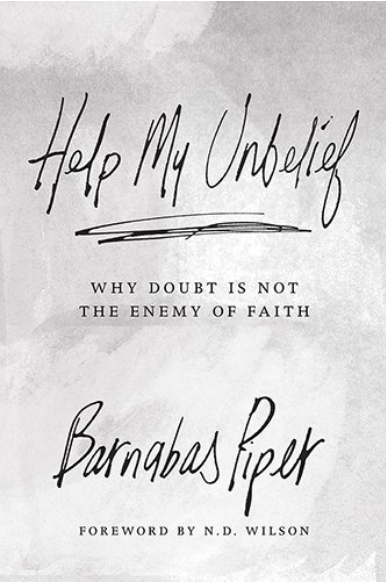Why Doubt is not the Enemy of Faith
 Barnabas Piper is releasing Help My Unbelief: Why Doubt is not the Enemy of Faith in July and reached out to a few of us who have wrestled in ongoing battles with faith and doubt. Of all the struggles in my life, this is the most pressing and the most fruit-filled. I have found joy and an increase of faith the more I confess and wrestle with my doubt. Barnabas asked five questions about faith and doubt and you can read them here.
Barnabas Piper is releasing Help My Unbelief: Why Doubt is not the Enemy of Faith in July and reached out to a few of us who have wrestled in ongoing battles with faith and doubt. Of all the struggles in my life, this is the most pressing and the most fruit-filled. I have found joy and an increase of faith the more I confess and wrestle with my doubt. Barnabas asked five questions about faith and doubt and you can read them here.
“I believe; help my unbelief” is my favorite phrase in scripture. It captures so much of what it means and takes to be a follower of Christ, encapsulating struggle, faith, doubt, obedience, wandering, and repentance. It is deeply theological and personal. For these reasons and more I wrote a book called Help My Unbelief: Why Doubt Is Not The Enemy of Faith (releases July 1) which explores what real belief is and its relationship with doubt in the life of a believer. The challenges of that tension are not unique to me; They’re nearly universal among Christians no matter position, maturity, or church tradition. In the weeks leading up to the release I will share the the thoughts and experiences of several friends of mine – authors, church leaders, writers, thinkers – who honestly answered five questions about faith and doubt. —Barnabas Piper
1) What does “I believe; help my unbelief” mean to you?
That God is never surprised by my weakness is a great comfort to me. My pastor says, “God doesn’t drive an ambulance,” which means God isn’t rushing around crazily trying to manage my life. The comfort of that reality allows me to walk in tensions of all kinds, but especially (for me), the tension of “I believe. Help my unbelief.” Belief has never come easily to me, especially belief in God. It’s not that I don’t believe He exists (though there have been extended periods of time of believing that) or believe He’s good, it’s that I don’t believe He means good to me. This is what the father of the demoniac was saying in Mark 9 when he said to Jesus, “If you can!” The entire gamut of doubt exists in that little word: if. It is not a question of yes or no, belief or unbelief, it is a question of whether God can and will. It ultimately has nothing to do with my ability to believe anything, and everything to do with God’s ability to do anything. That’s the tension of “I believe. Help my unbelief.” And it’s the tension that every believer, no matter how strong or weak, must walk in. Blind belief and stubborn doubt don’t serve us—or God. He wants our restless hearts to find our rest in Him. Keep reading.
